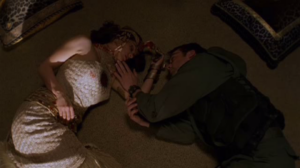This is RPG-ology #51: Motivation, for February 2022.
Our thanks to Regis Pannier and the team at the Places to Go, People to Be French edition for locating a copy of this and a number of other lost Game Ideas Unlimited articles.
Remember a while back I spoke about getting ideas from television? Well, here’s one of those ideas.

It was in an episode of Stargate: SG-1. Yeah, I probably forgot to mention I watch that, and Roswell, and The Crow: Stairway to Heaven, and Highlander: The Raven, and–well, that was another column, and I couldn’t hit everything. But I don’t have the pay channel for Stargate, so I only see the syndicated reruns long after they air initially (and I don’t know how long that is or how much is edited for broadcast). So this is an old episode. It doesn’t help that I missed the beginning; but I gather that in the first minutes Doctor Daniel Jackson’s wife Sha’re was killed.
By the time I tuned in, he was recovering from injuries and having strange hallucinatory dreams in which his wife was trying to contact him. But he was also preparing to resign from the Stargate team. His reason for wanting to resign was what caught my attention and brought me to write this idea.
“Every time I passed through that gate,” he tells us (or words very like this), “I was searching for my wife.”
I never knew that. I’d seen the movie, and started watching the series as soon as I realized it was being broadcast. I’m an old MacGyver fan (even got a game bonus for a MacGyverism once), so the fact that Richard Dean Anderson was doing a sci-fi series was a big draw for me. I knew about Daniel’s wife, how she was taken by the enemy and implanted with a symbiont, how he kept looking for her, how he protected her when the child was born. But I hadn’t made that connection: he was part of this because he had his own reason to be here. He was searching for his wife.
I’ve never done anything in a game quite so personal that I recall. But I have made it a point to provide some explanation for every character I’ve played and to every player character in my games regarding what has brought them to the start of these adventures, and why they are here. In many cases it has been simple. In fact, let me pull a group of D&D characters out of a game in which I played and give you examples.
The Dungeon Master took a cue from my playbook, and placed the action in a frontier location, a place where no one was really native and everyone had come from somewhere else. This meant that we each needed a reason to be here, a reason which had sent us from our homes and set our path on this adventure. The referee provided that reason in the dungeon we would be exploring. Some local miners had uncovered the entrance, a set of ancient doors behind a landslide in the side of the mountain. There was reason to believe that it was a place of ancient evil and power, in which something (and I’m not certain I ever quite understood exactly what) might be buried.
The party leader was a hobbit, a psionicist/thief-acrobat. He had been in the area and heard about this ancient mystery, figured there might be money in it, and fast-talked his way into getting some other characters to go with him. Always he was looking to line his pocketbook, and it got him in trouble more than once, but he was usually able to talk his way out of it again.
I was a young cavalier. My liege sent me to investigate. Each month I wrote a report of my discoveries which was sent by courier to his court. It was understood that if I determined this to be the ancient place of evil as rumored, he would send more experienced men to deal with it. Prideful and noble, I was easily taken in by the hobbit’s charisma and felt I should protect anyone so frail undertaking anything so dangerous—especially as he would be exploring the same area I had come to investigate.
There was an older woman in the group, a wu jen. Word of this discovery had spread, and her teacher had sent her to investigate as well, that he might obtain the secrets of the ancient magic if indeed they were there. She joined us because she believed there would be safety in having skilled warriors in her search.
This woman was the rebellious daughter of an aging daimyo, who still cared for his wayward daughter. A samurai was sent to watch over her and protect her at all costs; but he was not to reveal the reason for his presence. He thus had an inherent incentive to be part of our efforts.
But can the daimyo make a move without his enemies knowing? The local yakuza sent one of their own to watch the samurai, and to report his movements and investigations so there could be no surprises.
There was also a cleric among us, a drow also skilled as a fighter. She had changed her name and studied her new trades and moved to the frontier to muddy any trail that might be followed by an assassin of her people. But now that she was here, she needed work, we needed a cleric, her skill with the sword was a bonus, so she joined us.
Each character had an individualized reason to be where we were, and to do what we did. Sometimes those reasons were in conflict; I don’t know what would have happened had we actually discovered the alleged powerful evil something we sought. But our motivations brought us together and drove us forward on our adventures. Only one of us was really there to become wealthy; one was seeking to identify and destroy a great evil, another to capture a powerful magic, another to protect a party member, yet another to spy on a party member. It gave us both cohesion and individuality.
Every time Doctor Daniel Jackson passed through that gate he was looking for his wife; but I didn’t realize that. In fact, that driving motivation remained in the background and rarely had any impact on the actual stories. It’s entirely possible that some writer preparing this episode invented it out of whole cloth; yet it fit everything we already knew. It was the sort of revelation that makes you say, “Of course, that’s got to be it.”
And then his wife died, killed by his companions to save his life.
His motivation was gone.
And, not surprisingly, he was resigning from the team.
I think if my companions killed my wife while I was there, I’d have trouble going on with them. The fact that she was trying to kill me would hardly be mitigation; I try to prevent her from doing so from time to time (yeah, she’s part Irish), and so far have been successful. It would be difficult for me to agree that it was better for her to die than for her to kill me, even if I was convinced there was no other option. It seemed pretty obvious that Doctor Jackson would be leaving the show. He has no reason to stay, and every reason to leave.
And that’s where the show gives us the second lesson.
It was mystical, magical, strange in all the ways in which Stargate ideas are strange—like they’re supernatural, but have perfectly logical and scientific explanations which we just don’t get. Somehow his dead wife had tried to send him a message. I think she was focusing her soul into the blade with which she was stabbing him. O.K., if you don’t watch Stargate you’re not going to get that at all. Maybe you won’t get it even if you do. But she wanted him to know something, and those weird hallucinations were all about that message trying to reach his conscious mind. It seems she had a baby (and I remember when that happened). It seems that the baby is something special, something to do with the fact that she had a symbiont within her and the father of the child (not her husband, but her captor) also had a symbiont in him, and so the race memories of the symbionts are in the child. That means that the child—the son of Daniel Jackson’s wife—could be the key to destroying the evil symbionts against whom they battle. And as the husband of the mother of that child, Daniel Jackson stands in a special relationship to that child. He is the legal father, the putative parent, in loco parentis, perhaps. O.K., I don’t get it—but Daniel Jackson does. He has to find the child. For some reason, he has to do it.
Suddenly Dr. Jackson has a new motivation for stepping through that gate. He’s still searching for someone; but it’s another person, for another reason.
It’s important to provide characters with a motivation for their adventures, something more than just that they’re adventurers and this is an adventure. It’s also important in a story sense to bring some of those motivations to a climactic moment—whether to have them realized or to have them ultimately thwarted and destroyed. But as powerful as those moments are within the game, from a campaign perspective they can derail you completely—unless you prepare for it, and have a new motivation ready when the old one is resolved.

